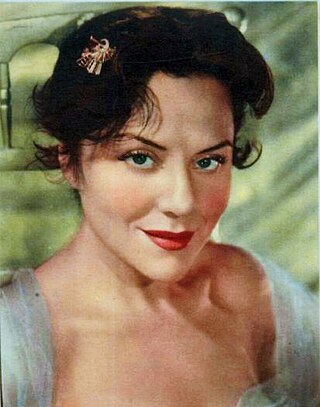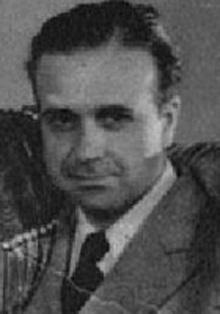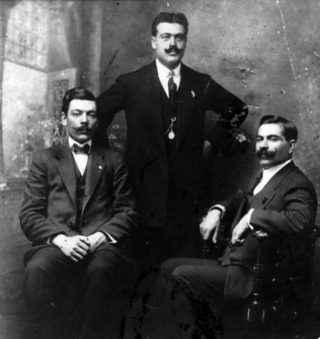Related Research Articles
Premio Nadal is a Spanish literary prize awarded annually by the publishing house Ediciones Destino, part of Planeta. It has been awarded every year on 6 January since 1944. The Josep Pla Award for Catalan literature is given at the same ceremony.

Alfredo Pareja Diezcanseco — born Alfredo Pareja y Díez Canseco — was a prominent Ecuadorian novelist, essayist, journalist, historian and diplomat. An innovator of the 20th-century Latin American novel, he was a founding member of the literary Grupo de Guayaquil, which brought a new emphasis to realistic novels.
The Golden Age of Mexican Cinema is a boom period in the history of Mexican cinema, which began in 1936 with the premiere of the film Allá en el Rancho Grande, and culminated in 1956.

María del Pilar Cuesta Acosta, known professionally as Ana Belén, is a Spanish actress and singer. She and her husband are considered symbols of the Spanish Transition, and her songs and albums often feature boldly-titled works with social and political content.

Amelia Bence was an Argentine film actress and one of the divas of the Golden Age of Argentine Cinema (1940–1960).
The Premio Adonáis, or Adonais Prize for Poetry, is awarded annually in Spain by Ediciones RIALP to an unpublished Spanish language poem. Runners-up are also recognized.

Carlos Francisco Borcosque Sánchez was a Chilean film director and screenwriter involved in the production of the Cinema of Argentina.

Pierre Bruno Hugo Fontana, otherwise known as Hugo del Carril, was an Argentine film actor, film director and tango singer of the classic era.

Alita Blanca Barchigia, better known as Alita Román, was an Argentine film actress of the Golden Age of Argentine Cinema (1940–1960).

Chilean cinema refers to all films produced in Chile or made by Chileans. It had its origins at the start of the 20th century with the first Chilean film screening in 1902 and the first Chilean feature film appearing in 1910. The oldest surviving feature is El Húsar de la Muerte (1925), and the last silent film was Patrullas de Avanzada (1931). The Chilean film industry struggled in the late 1940s and in the 1950s, despite some box-office successes such as El Diamante de Maharajá. The 1960s saw the development of the "New Chilean Cinema", with films like Three Sad Tigers (1968), Jackal of Nahueltoro (1969) and Valparaíso mi amor (1969). After the 1973 military coup, film production was low, with many filmmakers working in exile. It increased after the end of the Pinochet regime in 1989, with occasional critical and/or popular successes such as Johnny cien pesos (1993), Historias de Fútbol (1997) and Gringuito (1998).
Man on Pink Corner is a 1962 Argentine film directed by René Múgica, based on the story by Jorge Luis Borges. It was shown at the Cannes and San Sebastián film festivals.
The third annual Altazor Awards took place on March 25, 2002, at the Museo Nacional de Bellas Artes.

Luis Vicentini was a Chilean boxer. In 1922 he starred in Carlos F. Borcosque's debut picture Hombres de esta tierra.
Traición is a 1923 Chilean silent film, the second film of Carlos F. Borcosque. It stars María Brieba, Yvonne D'Albert, Jorge Infante and boxer Luis Vicentini.
Vida y milagros de Don Fausto is a 1924 Chilean animated silent comedy film, the third film of Carlos F. Borcosque which he shot with director Carlos Espejo. It was based on the Bringing Up Father comic strip.

Titanes en el ring was an Argentine lucha libre television program aired between 3 March 1962 and 1988.

Francesco Di Domenico (1880–1966) and Vincenzo Di Domenico (1882–1955), known together as the Di Domenico brothers, were Italian film directors who played an important role in Colombian cinema.

The Salaverry-Santa Cruz War, sometimes called the Peruvian Civil War of 1835–1836, was an internal conflict in Peru with the involvement of the Bolivian army of Andres de Santa Cruz. It ended with the defeat and execution of Felipe Santiago Salaverry and the creation of the Peru-Bolivian Confederation.
This is a list of Spanish television related events in 1970.
References
- ↑ Plazaola, Luis Trelles (1 January 1989). South American Cinema/ Cine De America Del Sur: Dictionary of Film Makers/ Diccionario De Los Productores De Peliculas. La Editorial, UPR. p. 36. ISBN 978-0-8477-2011-8.
- ↑ Mouesca, Jacqueline; Orellana, Carlos (1 January 1998). Cine y memoria del siglo XX: cine en Chile : cine en el mundo : historia social y cultural de Chile : historia social y cultural mundial cuadros sinópticos (1895-1995) (in Spanish). LOM Ediciones. p. 104. ISBN 978-956-282-077-6.